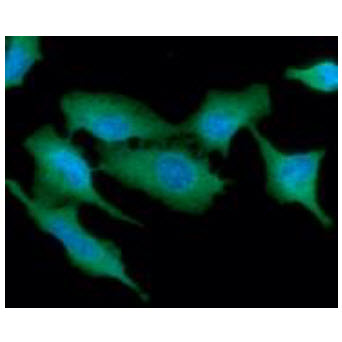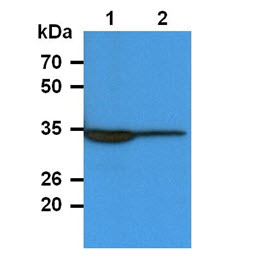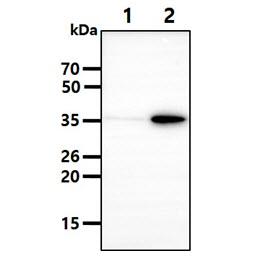Product Information
- Product Type
- Monoclonal Antibody
- Clone Number
- AT1C9
- UniProt No.
- Q53FA7
- NCBI Accession No.
- NP_671713
- Alternative names
- Quinone oxidoreductase PIG3, NADPH:quinone reductase PIG3, Tumor protein p53-inducible protein 3, p53-induced gene 3 protein
Product Specification
- Host
- Mouse
- Reacts With
- Human
- Concentration
- 1mg/ml (determined by BCA assay)
- Formulation
- Liquid in. Phosphate-Buffered Saline (pH 7.4) with 0.02% Sodium Azide, 10% glycerol
- Immunogen
- Recombinant human TP53I3 (1-332aa) purified from E. coli
- Isotype
- IgG2a kappa
- Purification
- By protein-G affinity chromatography
- Applications
- ELISA, WB, ICC/IF
- Usage
- The antibody has been tested by ELISA, Western blot and ICC/IF analysis to assure specificity and reactivity. Since application varies, however, each investigation should be titrated by the reagent to obtain optimal results.
- Storage
- Can be stored at +2C to +8C for 1 week. For long term storage, aliquot and store at -20C to -80C. Avoid repeated freezing and thawing cycles.
Data
Immunocytochemistry/Immunofluorescence (ICC/IF)
ICC/IF analysis of TP53I3 in A549 cells. The cell was stained with ATGA0227 (1:100). The secondary antibody (green) was used Alexa Fluor 488. DAPI was stained the cell nucleus (blue).
Western blot analysis (WB)
The Cell lysates (40ug) were resolved by SDS-PAGE, transferred to PVDF membrane and probed with anti-human TP53I3 antibody (1:3000). Proteins were visualized using a goat anti-mouse secondary antibody conjugated to HRP and an ECL detection system.
Lane 1. : A549 cell lysate
Lane 2. : SW480 cell lysate
Lane 1. : A549 cell lysate
Lane 2. : SW480 cell lysate
The Cell lysates (1ug) were resolved by SDS-PAGE, transferred to PVDF membrane and probed with anti-human TP53I3 antibody (1:3000). Proteins were visualized using a goat anti-mouse secondary antibody conjugated to HRP and an ECL detection system.
Lane 1.: 293T cell lysate
Lane 2.: TP53I3 Transfected 293T cell lysate
Lane 1.: 293T cell lysate
Lane 2.: TP53I3 Transfected 293T cell lysate
Note: For research use only. This product is not intended or approved for human, diagnostics or veterinary use.


